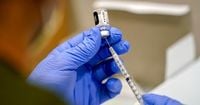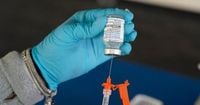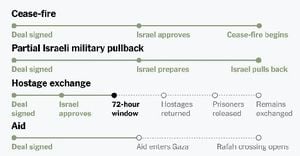On August 27, 2025, the U.S. Food and Drug Administration (FDA) approved a new round of COVID-19 vaccines, but with a twist that’s already stirring debate and raising questions about access and public health. Unlike previous years, when COVID shots were recommended for nearly everyone over six months old, this fall’s rollout is strictly limited to those considered at higher risk for severe illness. The move, announced by Health and Human Services Secretary Robert F. Kennedy Jr., marks a significant shift in the nation’s vaccination strategy as the country braces for another respiratory virus season.
According to ABC News and the Associated Press, the FDA granted approval for Pfizer-BioNTech’s updated vaccine for adults aged 65 and older, as well as for individuals between ages 5 and 64 who have at least one underlying health condition—such as asthma, obesity, cancer, or heart disease—that increases their risk for severe COVID-19. Moderna’s vaccine is now available to Americans aged 6 months and older, but only if they are at high risk, while Novavax’s shot is approved for those 12 and older under the same risk-based restrictions. The 2025-2026 Pfizer-BioNTech vaccine specifically targets the LP.8.1 sublineage, an offshoot of the JN.1 subvariant, to better match the strains currently circulating in the U.S.
"These vaccines are available for all patients who choose them after consulting with their doctors," Kennedy wrote on X, formerly known as Twitter. He added, "The American people demanded science, safety, and common sense. This framework delivers all three." But the reality is more complicated, with new hurdles for many Americans who may want—or need—protection as the virus continues to evolve.
One of the most notable changes is the end of emergency use authorizations for COVID vaccines, a move Kennedy said was designed to shift away from the broad mandates seen during the pandemic’s early years. The FDA’s decision revokes Pfizer’s emergency authorization for children under five, meaning that parents seeking a shot for their young children will have to turn to Moderna, which is only approved for high-risk kids as young as six months. As AP reports, this leaves millions of healthy children and adults suddenly ineligible for vaccination unless they can prove a qualifying medical condition.
The new restrictions have not gone unnoticed by medical professionals and advocacy groups. The American Academy of Pediatrics (AAP), the leading pediatrician group in the country, called the FDA’s decision "deeply troubling." In a statement, Dr. Susan Kressly, AAP president, warned, "As we enter respiratory virus season, any barrier to COVID-19 vaccination creates a dangerous vulnerability for children and their families. Respiratory illnesses can be especially risky for infants and toddlers, whose airways and lungs are small and still developing." The AAP continues to recommend annual COVID shots for all children ages 6 months to 2 years, and advises vaccination for older children, especially those at higher risk or living in congregate settings.
These concerns are echoed by other medical organizations. The American College of Obstetricians and Gynecologists recommends that patients receive updated COVID vaccines during pregnancy, while planning to become pregnant, postpartum, or while lactating. The American College of Cardiology has also endorsed COVID, flu, and RSV vaccines for people with heart disease. Such recommendations underscore a growing rift between federal policy and the guidance of major health groups, which typically align more closely.
For the first time since the vaccines were introduced, patients will no longer be able to book COVID shots directly at pharmacies without a doctor’s consultation. Instead, individuals must now consult with their healthcare provider, adding another layer of complexity to the process. This change is expected to result in logistical headaches—not just for patients, but for doctors and pharmacists as well. Andy Pekosz, a virologist at Johns Hopkins University, told AP, "This makes things much more complicated, and when things get complicated we see vaccine uptake go down."
Access is further complicated by insurance coverage uncertainties. Insurers often look to recommendations from the Centers for Disease Control and Prevention’s (CDC) vaccine advisory panel, but that panel’s future direction is unclear. In June, Kennedy removed all 17 members of the CDC’s vaccine advisory committee, replacing them with his own hand-picked members, several of whom have previously expressed skepticism about vaccine safety and necessity. The panel is expected to meet in September to make recommendations, but no agenda has been released. Depending on the panel’s advice, Americans under 65 could be required to provide documentation of a serious medical problem before receiving a shot. And with pharmacists typically not expected to collect such information, the process could become even more unwieldy.
Coverage questions loom large, especially for families and individuals who don’t qualify under the new criteria. If the CDC’s advisory panel does not recommend the updated vaccines for certain groups, many insurers may not cover the cost. According to the CDC vaccine price list, a COVID-19 shot could cost more than $140 in the private sector, and some estimates put the out-of-pocket cost as high as $150. The shots might also not be covered by the Vaccines for Children program, a federally funded initiative that provides no-cost vaccines to eligible children.
For those determined to get vaccinated but who don’t meet the new eligibility criteria, the only option may be to find a doctor willing to prescribe the shot "off-label." However, as AP notes, many pharmacists may be reluctant to administer vaccines outside of FDA guidance, further limiting access for healthy adults and children seeking extra protection.
The new policy arrives as COVID cases are once again on the rise in parts of the U.S., particularly in the South and California, driven by a new variant. The CDC reports a slight increase in emergency room visits and hospitalizations related to COVID, though numbers remain much lower than last year. Preliminary CDC data estimates that 47,500 Americans died from COVID-related causes in 2024. Some experts worry that restricting vaccine access could place additional strain on hospitals this winter. Amanda Jezek of the Infectious Diseases Society of America cautioned, "Down the line, this will really stress our health workforce. The public health impacts here are very worrisome."
Meanwhile, the Trump administration has recently pulled funding for the development of mRNA vaccines, which were crucial in the early pandemic response, adding more uncertainty to the future of COVID vaccine innovation.
As the nation moves into the fall and winter with a patchwork of recommendations and eligibility rules, one thing is clear: the path to COVID-19 vaccination is now more complicated than ever. The coming weeks will test the new system’s ability to protect those most at risk—while leaving many others to navigate a maze of requirements, costs, and conflicting guidance.






